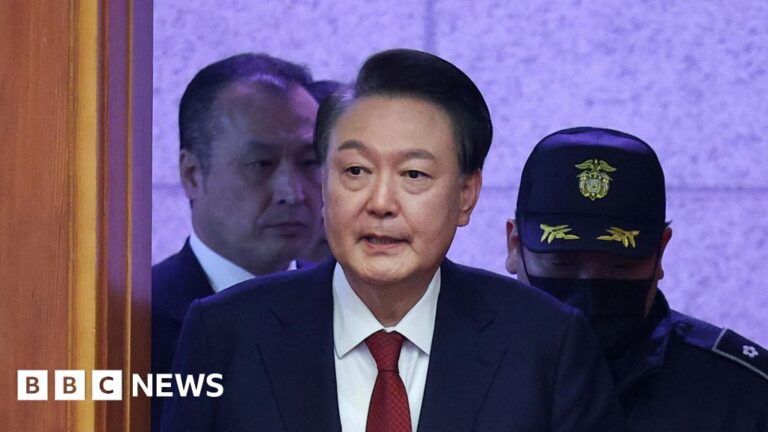South Korea’s deposed president Yoon Suk Yeol has been charged with insurrection after attempting to declare martial law in December.
His failed attempt to impose military rule plunged the country into an unprecedented political crisis and he became the first sitting president in South Korean history to be charged with a crime.
The indictment comes after a Seoul court rejected a request to extend Yoon’s detention on Saturday, which meant prosecutors had to make a decision on whether to do so or release him before Monday.
“The punishment of the insurrection leader now finally begins,” Han Min-Soo, a spokesman for the main opposition Democratic Party, told a news conference.
Separately, the Constitutional Court has begun deliberations on whether to formally reject Yoon as president or reinstate him.
The indicted president has largely refused to cooperate with the criminal investigation into the declaration of martial law.
Yoon is expected to be tried along with his former defense minister and senior military commanders, who are accused of helping him plan and carry out the attempt to seize total power.
In an unprecedented television announcement on Dec. 3, Yoon said he was invoking martial law to protect the country from “anti-state” forces that sympathized with North Korea.
At the time, the embattled leader was in an impasse over a budget bill, dogged by corruption scandals and several of his ministers were under investigation.
The military announced that all parliamentary activities were suspended and sought to impose controls on the media.
Opposition Democratic Party leader Lee Jae-Myung urged people to protest at the National Assembly and asked his fellow lawmakers to vote immediately to repeal the order.
Less than two hours after Yoon’s statement, 190 lawmakers who gathered — including some from the president’s party — voted unanimously to block him.
Soldiers equipped with rifles were seen entering the Parliament building through broken windows as a dramatic confrontation ensued.
Thousands of civilians gathered in front of the assembly and attempted to block the soldiers.
Yoon was impeached by Parliament and suspended from office on December 14.
The case sparked South Korea’s worst political crisis in decades and polarized the country.
Many of his hard-liners rallied around him. On Friday, tens of thousands of people gathered to protest, demanding that he be released and returned to office.
If Yoon is removed from office, a presidential election will be held within 60 days.
The prosecutors’ office did not immediately respond to requests for comment.

